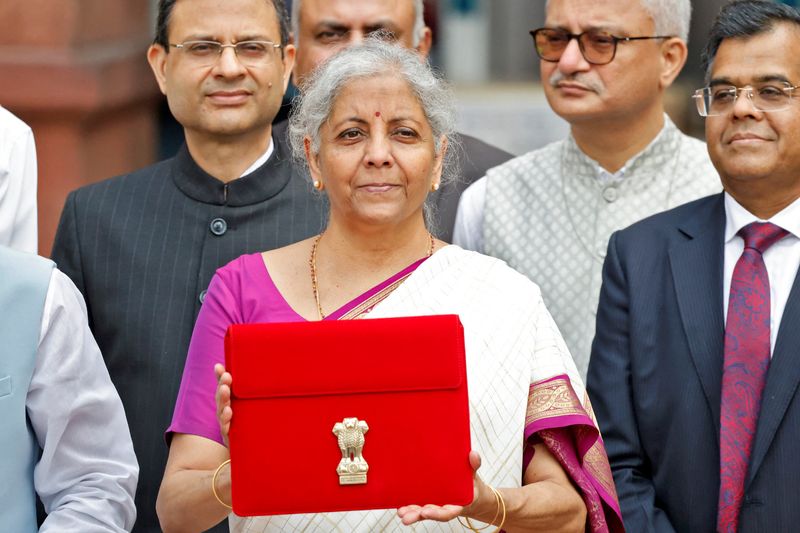By Sarita Chaganti Singh, Nikunj Ohri and Shivangi Acharya
NEW DELHI (Reuters) -India's government assigned billions of dollars for job creation and regions run by key coalition partners in a budget aimed at cementing the coalition and winning back voters after Prime Minister Narendra Modi's election setback.
Tax changes unveiled in the budget included a higher levy on equity investments to allay concerns the market might be overheating and lower taxes for foreign companies to attract more investment.
The $576 billion in total outlays included $32 billion for rural programmes, $24 billion to be spent over five years to create jobs, and more than $5 billion for two states ruled by coalition partners.
"In this budget, we particularly focus on employment, skilling, small businesses, and the middle class," Finance Minister Nirmala Sitharaman said on Tuesday.
The government will also implement reforms across factors of production, including land and labour, she said.
Subsequent budgets would continue to focus on those areas, Sitharaman said while presenting her seventh annual budget.
Despite the new spending, India cut its fiscal deficit target to 4.9% of gross domestic product in fiscal year ending on March 31, 2025, from 5.1% in February's interim budget, helped by a large surplus of $25 billion from the central bank.
The government also marginally reduced gross market borrowing to 14.01 trillion rupees.
Economist had blamed the distress in rural areas and a weak job market for a poor poll showing that cost Modi's Bharatiya Janata Party (BJP) its absolute majority. They say land and labour reforms are essential for India to sustain strong economic growth.
Asia's third-largest economy grew 8.2% in the past fiscal year and the government sees growth of 6.5% to 7% this fiscal year, a report showed on Monday.
Sakshi Gupta, principal economist at HDFC Bank, said the budget managed to strike a balance between policies supporting growth and maintaining fiscal discpline.However, implementing more ambitious reforms, will be "challenging" for the coalition, Gene Fang, associate managing director for sovereign risk at Moody's (NYSE:MCO) Ratings, told Reuters.
Previous attempts to make it easier for companies to acquire land and lay off staff have repeatedly faced pushback from states concerned about protests such measures might provoke.
Among measures aimed at boosting employment, the budget included incentives for companies to train staff as well as and cheaper loans for higher education, Sitharaman said.
India's reported urban unemployment rate is 6.7%, but private agency the Centre For Monitoring Indian Economy pegs it higher, at 8.4%.
The budget also maintains spending on long-term infrastructure projects at 11.11 trillion rupees, with states assigned 1.5 trillion rupees in long-term loans to fund such expenditure. Some will be linked to reform milestones in areas such as land and labour, which Sitharaman said the government intended to push in its third term.
In a concession to the government's allies, Sitharaman said it would hasten loans from multilateral agencies for the eastern state of Bihar and the southern state of Andhra Pradesh.
TAX CHANGES
India raised to 20% from 15% its tax rate for equity investments held for less than a year, while the rate for those held longer than 12 months rose to 12.5% from 10%. The taxes will be applicable from Wednesday.
The government also increased the tax on equity derivative transactions that have drawn retail investors, which will be implemented from Oct. 1.
Shares and the rupee declined after the budget announcement but recovered most of the losses with main stock indexes ending the day down about 0.13%.
The tax changes were a short-term negative for the market, but could pay off in the longer term, said Vineet Arora, investment manager at Singapore-based NAV Capital Emerging Star Fund.
"It is expected to help in stabilizing the market and attracting investors with a long-term perspective on the Indian economy," Arora said.

Corporate tax for foreign companies was cut to 35% from 40%, with the aim of encouraging more investment, while a lower tax burden for lower income consumers, expected to encourage spending, helped drive consumer stocks to record highs.
($1=83.6410 rupees)